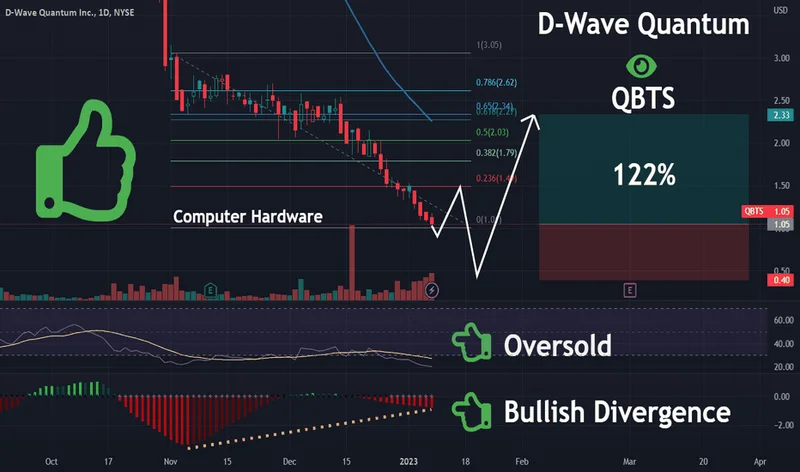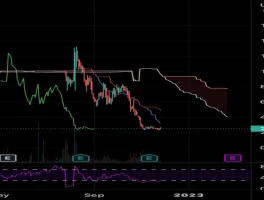So, you missed the AI gravy train. Don’t worry, Wall Street has cooked up a fresh new fantasy for you to lose your shirt on: quantum computing. And the poster child for this latest round of speculative insanity is a company called D-Wave Quantum (QBTS).
If you haven’t been paying attention, this stock went from being a sub-$1 penny stock afterthought in 2024 to a market darling hitting over $46 a share in October. That’s a 3,000% surge. A $1,000 bet a year ago would have turned into $30,000. It’s the kind of story that makes people quit their jobs and start day trading from their mom’s basement. It’s also the kind of story that almost never ends well.
Let’s be brutally honest here. At its peak, D-Wave was trading at a market cap of over $13 billion on projected revenues of maybe, maybe, $30 million for 2025. That’s a price-to-sales ratio north of 400. For context, the dot-com bubble leaders topped out at P/S ratios of 30 or 40 before they imploded. This isn’t just exuberant; it’s a complete detachment from reality.
This isn't investing; it's like betting on a racehorse that's still a foal, but you're paying the price as if it's already won the Triple Crown. The horse might be a future champion, but it could also just... fall over. What are we even doing here? Are we supposed to believe that a company with the revenue of a decent-sized car dealership is suddenly worth more than the GDP of a small country?
The "But the Tech is Real!" Defense
Now, the bulls—and there are apparently a lot of them—will scream at me about the "breakthroughs." And okay, fine, let's look at them. D-Wave isn't just selling smoke. They inked a €10 million deal to put one of their quantum annealing computers in Italy. That's their first big sale in Europe. Cool.
They also ran a pilot program with the North Wales Police that optimized emergency response times, cutting a process that took four months down to four minutes. CEO Alan Baratz called it proof of "real-world potential." And I’m sure it is. But does one pilot program with a UK police force and one sale in Italy justify a valuation that rivals established, profitable companies? Give me a break.
This is the classic playbook for a hype stock. Dangle a few genuinely interesting, futuristic-sounding use cases in front of investors who are desperate for the "next big thing." Throw in some rumors about the U.S. government taking an equity stake—which, offcourse, sent the stock soaring before the Commerce Department had to splash cold water on it—and you’ve got a self-perpetuating hype machine.

The whole thing feels so manufactured. It's like the market is a bored teenager, and after playing with the AI toy for a year, it's now smashing the quantum computing toy against the wall to see what happens. And of course, the Magnificent Seven have to get shoehorned into the narrative, with pundits breathlessly pushing the idea to Move Over, IonQ, Rigetti Computing, and D-Wave Quantum -- There's a Much Smarter Way to Invest in the Quantum Computing Revolution by simply buying more Amazon or Microsoft. It's just so tiresome.
Even the Wall Street analysts are playing along, though you can see the sweat on their brows. Eleven out of twelve have a "Buy" rating on the stock. Yet, the average price target is around $27—miles below where the stock has been trading. What does that even mean? It's a CYA move. They're saying, "We think you should buy it, but uh, not at this price. But also please don't yell at us if it goes to $100." It’s a bad sign. No, "bad" doesn't cover it—it's a five-alarm dumpster fire of conflicted interest.
A Bubble Looking for a Pin
At the end of the day, D-Wave’s stock chart looks less like a company's growth curve and more like a seismograph during an earthquake. Daily swings of 10-20% have become normal. The company just redeemed its public warrants, a move to clean up the balance sheet that also adds about 2% more shares to the float, a development that helps explain Why D-Wave Quantum Stock Plummeted This Week. In the grand scheme of things, it’s a minor move, but in this jittery environment, any news sends the stock flying or diving.
There's even a 2x short ETF (QBTZ) now, specifically created so people can bet against D-Wave. When the market creates financial instruments just to short your company, you're not a company anymore; you're a casino.
So what happens next? The hype train will either find more fuel, or it will run out of track. Maybe the government rumors turn out to be true. Maybe D-Wave announces a massive, game-changing contract that actually justifies some of the madness. Or maybe, just maybe, the market comes to its senses, realizes it's paying a fortune for a lottery ticket, and the whole thing comes crashing down.
Then again, people said the same thing about Amazon in '99. Maybe I'm just the old man yelling at a cloud, too cynical to see the future taking shape right in front of me. But I doubt it. History is littered with the wreckage of "paradigm-shifting" technologies that were right on the tech but dead wrong on the timing and valuation. This feels exactly like one of those moments.
This whole thing is a joke. It’s a calculated fleecing of retail investors who are high on FOMO. They see a 3,000% gain and think they can catch the next 3,000%, but the party is already...
This Ends in Tears, Doesn't It?
Look, I get it. The technology is fascinating. Quantum computing could change everything. But we're not trading the technology; we're trading a stock. And this stock is a balloon that's been inflated with pure, uncut hype. Every historical precedent, every fundamental metric, every shred of common sense screams that this is a bubble. The only question is who will be left holding the bag when it pops. My money is on the people buying in right now.

